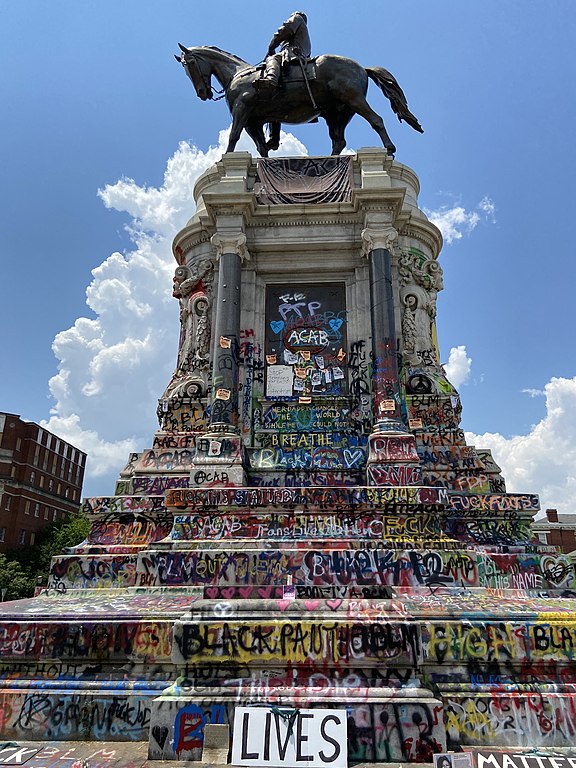On Pulling Down Statues
Sometimes it is good and proper to pull down statues, sometimes ambiguous, and sometimes the motives are troubling. What are the spiritual issues? Christian historian Rev. William De Arteaga, known to Pneuma Review readers as a scholar of the healing ministry and revivals, discusses several subjects in an article (on another site) about statue toppling including: Cancel culture, the Lost Cause myth, the fall of communism in Eastern Europe, and the consequences of ignoring history.

Robert E. Lee Monument in Richmond, Virginia, as it stood on July 1, 2020, after being defaced during the George Floyd Protests. The Lee Monument was the first installation on Monument Avenue in 1890, and as of August 2020, it remains the last Confederate monument on the Avenue.
Image: Wikimedia Commons
Some quotations from the article:
When it comes to statues and busts of people in a non-religious setting, the Bible is silent. Paul was “provoked” with disgust while at Athens at all the statues (Acts 17:16), but in the context of the time and place, these statues carried a spiritual intention as being images of a god or of a person thought to be deified, as in a Roman Emperor.
[In the universities,] The Ten Commandments have long been forgotten, and for students there are only three sins: Greed (capitalism) environmental insensitivity, and racism. All the weight of moral development is put on these items. Meanwhile student ethics are in shambles, sexual licentiousness and manipulation (not recognized as problems) cheating and copying on term papers and exams, substance abuse, etc., are rampant. Character development as a goal is a thing of the past. Students can believe themselves morally enlightened and superior if they correctly speak Left-wing egalitarianism and are adamantly anti-racist – regardless of the hatred lodged in their hearts.
Scripture points to a different way. All persons are sinners, some persons make progress in certain areas of human suffering and injustice, yet have faults that they never overcome. For instance, the book of Judges contains various histories of ‘judges’ i.e. leaders who liberated Israel form the oppression of the Philistines, but they all had character flaws, as Samson who lusted after Philistine women. A good historian, or student of history, instinctively knows this. A person should be judged according to the standards and prejudices of his generation. Did he or she make progress, even small progress, towards freedom, justice and love of neighbor?
To read the full article:
“The Good, the Bad, and the Ugly: On the toppling of statues”
http://www.pentecostaltheology.com/the-good-the-bad-and-the-ugly-on-the-toppling-of-statues
Category: Living the Faith, Summer 2020


